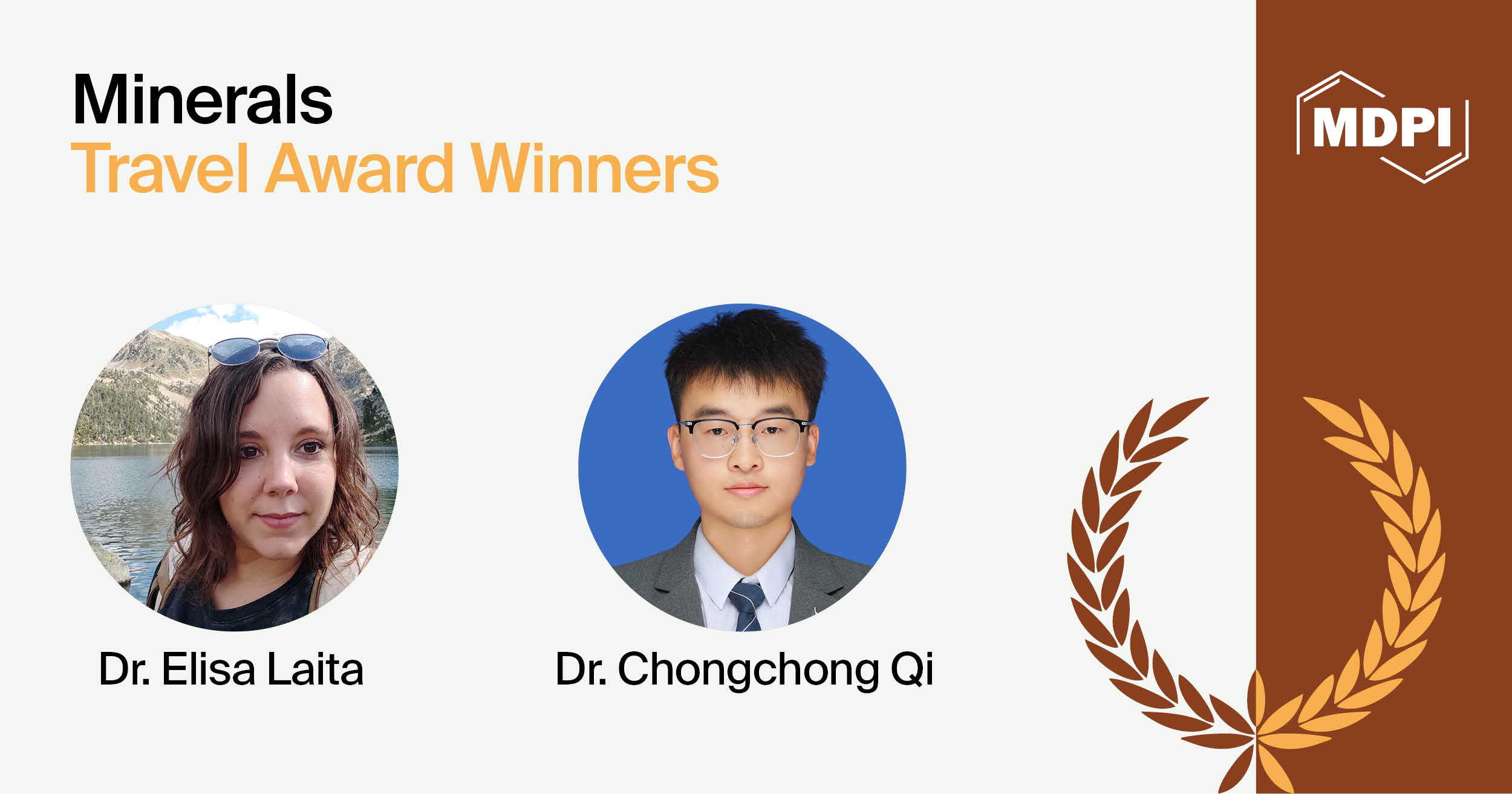
Interview with Dr. Elisa Laita and Dr. Chongchong Qi—Winners of the Minerals 2025 Travel Award
We are pleased to announce Dr. Elisa Laita and Dr. Chongchong Qi as the winners of the Minerals 2025 Travel Award. The Minerals Travel Award was launched in 2016, and it is awarded every year to encourage young scientists to present their latest research at academic conferences in the fields of mineralogy, mineral geochemistry and geochronology, economic mineral resources, mineral exploration, innovative mining techniques, and advances in mineral processing. The winners of this award will receive CHF 800 each and a certificate. The winners were chosen by the journal’s award committee—Prof. Dr. Leonid Dubrovinsky, Prof. Hyunjung Kim, Dr. Alexandra Guedes, Dr. Jianxi Zhu, Dr. Alexander R Cruden, and Dr. Paul Alexandre.
Dr. Elisa Laita received a bachelor’s degree in geology in 2015 at the University of Zaragoza (Spain), where she also completed an M.Sc. in geology and an M.Sc. in Secondary Education in 2016 and 2017, respectively. She defended her Ph.D. at the same university in 2022, and she was awarded the extraordinary Ph.D. award. Her research has focused on the mineralogical and geochemical characterization of clay-rich materials, both from paleoclimatic and industrial perspectives. She is currently a postdoctoral researcher at the Geology Department of the University of Jaén (Spain). She has published 16 scientific articles in JCR-indexed journals, participated in five research projects, and completed both predoctoral and postdoctoral research stays at the Institute of Analytical and Physical Chemistry for the Environment and Materials (Pau, France). She has presented her work at seven international conferences and more than ten national ones and has taken part in numerous seminars and webinars. In addition, she actively collaborates in science outreach activities related to geology, aiming to make earth sciences more accessible to the public.
Dr. Chongchong Qi received a B.Sc. in mining engineering from the China University of Mining and Technology (2016) and a Ph.D. in mining engineering from The University of Western Australia (2019), where his thesis, “Machine-Learning Aided Design for Cemented Paste Backfill”, pioneered innovative approaches to mineral-based materials. Since 2019, he has led transformative research in cemented paste backfill (CPB), green mining, and heavy metal remediation—areas central to mineral sciences. He has also published several papers in Minerals (ISSN: 2075-163X), with one of them being recognized as the Most Cited & Viewed Paper in Minerals in 2020. Dr. Qi also actively participates in the editorial process of Minerals, having joined the Editorial Board of Minerals and led several Special Issues.
We were honored to interview Dr. Elisa Laita and Dr. Chongchong Qi. The interview is summarized below:
1. Could you briefly introduce yourself and tell us about your field of research?
Dr. Elisa Laita: My name is Elisa Laita, and I am currently a postdoc researcher at the Geology Department of the University of Jaén (Spain). My main research line is focused on the mineralogical and geochemical analysis of clay minerals included in palaeosols and clay-rich rocks with both palaeoclimatic and industrial perspectives.
Dr. Chongchong Qi: My name is Chongchong Qi, and I am an Honorary Research Fellow at the University of Western Australia. My work focuses on mitigating the environmental impacts of mineral extraction and use, including tailings recycling via cemented paste backfill technology, identification of mining-induced heavy metal pollution, pollution remediation, etc.
2. In your previous collaborations with MDPI, what impressed you the most?
Dr. Elisa Laita: In my previous collaborations with MDPI (as an author, reviewer, and currently as a Guest Editor), I have been most impressed by the efficiency of the editorial process, and I appreciate the opportunity to contribute to the scientific community.
Dr. Chongchong Qi: One of MDPI’s major advantages is its fast peer-review process, made possible by the dedication of both the Editorial Office and the reviewers. When timely publication is crucial—such as supporting students’ graduations—MDPI is among the top choices.
3. Which research topics do you think will be of particular interest to the research community in the coming years?
Dr. Elisa Laita: I think that mineralogy will continue to be central for addressing global challenges in the coming years. The role of certain critical raw materials in green technologies will gain importance. I also think that advances in analytical techniques will open new avenues for exploring minerals at micro- and nanoscale levels.
Dr. Chongchong Qi: Today, AI is revolutionizing every stage of research—from idea generation and experimental design to data analysis and manuscript writing. I am confident the minerals community will experience the same transformation, with AI-supported minerals exploration, extraction, utilization, and recycling.
4. As the winner of this award, would you like to take a moment to share your thoughts with our readers or express gratitude to those who have played a significant role in your research accomplishments?
Dr. Elisa Laita: I am very grateful for this award, and I would like to express my gratitude to all those who have supported me through my academic journey. Thank you to my colleagues and mentors at the University of Zaragoza (Spain), as well as to my colleagues from the University of Jaén (Spain) and IPREM (Pau, France) for their guidance, dedication, and support.
Dr. Chongchong Qi: This award means a lot to me, as it offers an invaluable opportunity to present my research at such a prestigious conference. I am deeply grateful to the many wonderful people who have supported me along the way—especially my wife and sons, my supervisors at the University of Western Australia and Central South University, and my friends for their encouragement and assistance.
